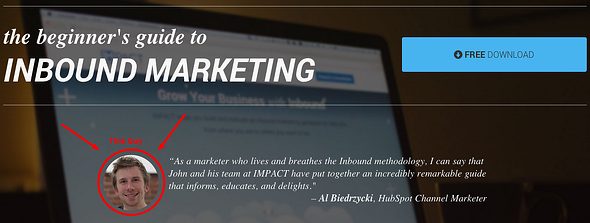Topics:
Lead GenerationSubscribe now and get the latest podcast releases delivered straight to your inbox.
 You know how your mom always told you not to take candy from strangers?
You know how your mom always told you not to take candy from strangers?
What do you think she'd say about giving away your contact information to a stranger?
She'd probably advise you against that too, right?
When it comes to effective landing page creation, the goal is to position yourself as a trusted resource, not a stranger. If you fail to do so, visitor's aren't going to feel comfortable dishing out their 411. It's quite simple.
In order to reduce friction and ease the skeptical mind of your landing page visitors, you have to focus on conveying your message in the most straightforward way possible.
The following four questions are designed to get you thinking about the legitimacy of your existing landing pages to help you resolve reluctancy and start converting more leads.
Did you match the message?
If your landing page offers aren't consistent with your calls-to-action, people are going to notice. There's really no excuse for it.
I don't care if your competitors are blowing you out of the water with awesome content, or you're having a bad month in terms of lead generation, the old bait-and-switch technique will never be the answer.
By duping your visitors by employing misleading CTA copy, you're positioning your business as one that is not to be trusted. Businesses that can't be trusted don't
The level of consistency between your CTA and your landing page is necessary to to assure visitors that they've arrived in the right place. If you tell them one thing and then show them another, they're going to walk.
Are you focusing on one goal?
A landing page shouldn't take visitors here, there, and everywhere.
If you're struggling to communicate one clear goal, visitors are going to begin to wonder what they're really getting out of the deal.
Simply put, the more CTAs you include, the more friction you create. If they begin to feel overwhelmed by the number of directions you're trying to steer them in, they're not going to convert on anything at all.
Eliminate the guesswork.
Center your landing page around one keyword or keyword phrase, and build the content out accordingly. This approach will not only make it easier for you to rank higher on search engine results pages, but it will a eliminate the bad taste that keyword stuffing leaves in your visitor's mouth.
Where's the proof?
Landing page visitor's don't just want to take your word for it.
They've been lied to, spammed, and cheated one too many times to be willingly hanging on every word you say.
When it comes to building trust, what better way than to call upon the input of a third-party source.
On-page testimonials have the ability to make your business seem more appealing, more legitimate, and more worthy of their contact information.
Check out how we incorporated testimonials on our landing page for The Beginner's Guide to Inbound Marketing:

Another great way to uncover and highlight social proof is to do a quick search on social media for users who have shared your content. What are they saying about it? Uncover it and include it.
Are you using the right language?
Self-serving landing page copy is the pits.
If your focused on conveying how awesome you and your awesome product are, you're not going to appeal to the audience. They're not going to feel compelled to convert.
Rather than spill a sales pitch all over the page, place your focus on highlighting the way in which your product, service, or offering is going to affect them, their goals, and their day to day.That's what they care about. What's more appealing?
"10 email templates"
or
"10 free email templates that will save you time"
Stating the benefit isn't enough. You have to find a way to tie in back into the visitor's life if you want them to really trust you.


Order Your Copy of Marcus Sheridan's New Book — Endless Customers!

